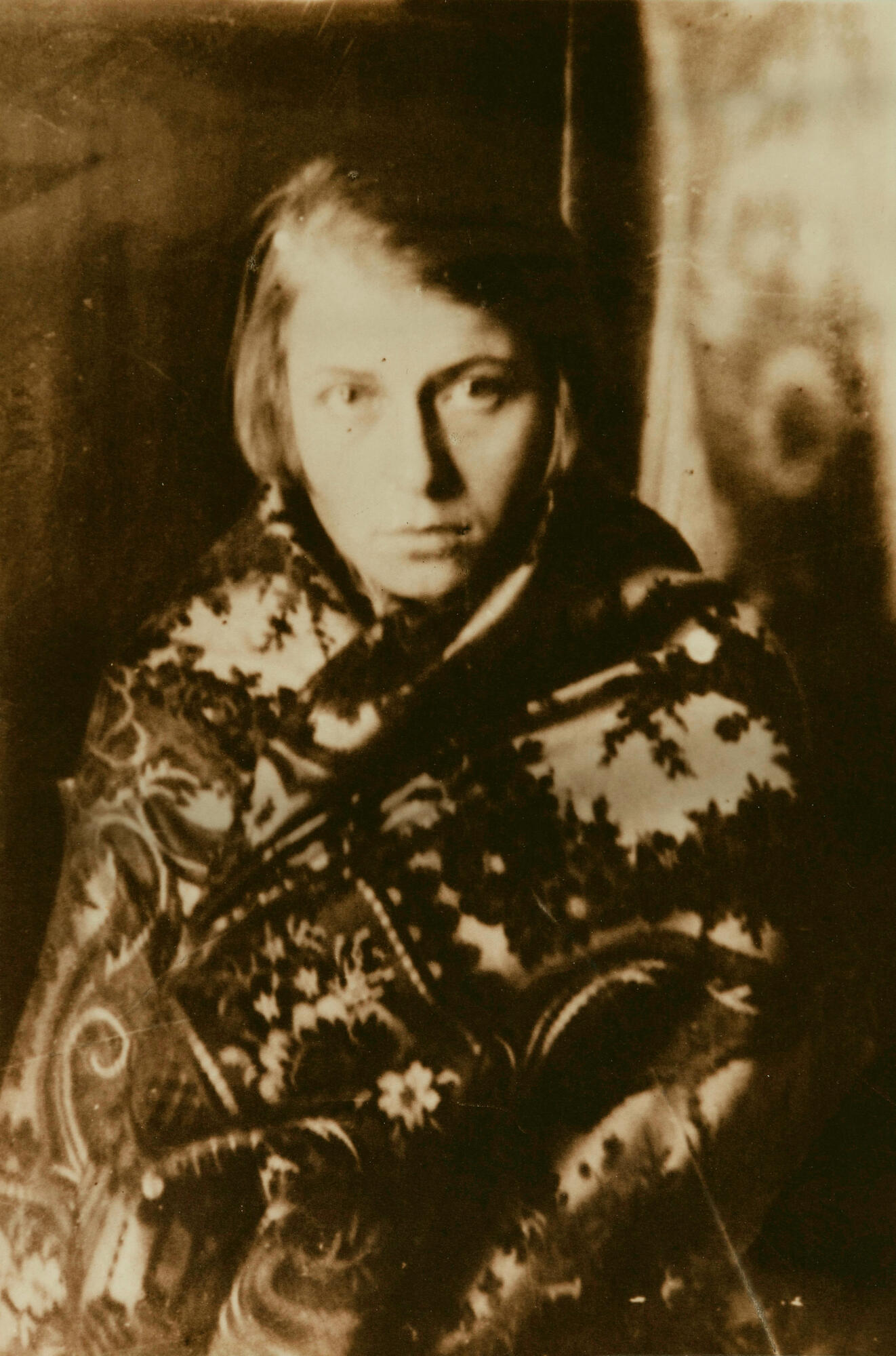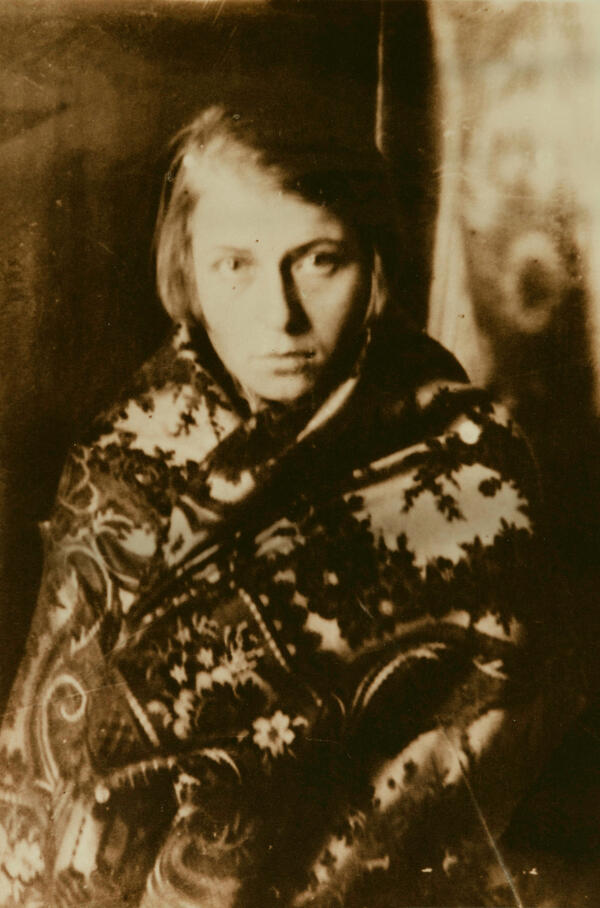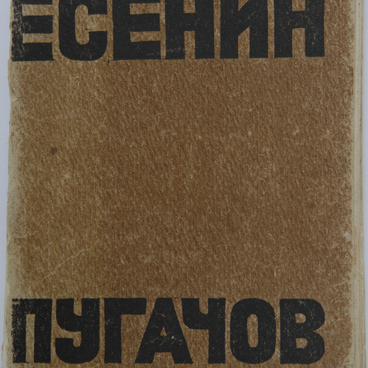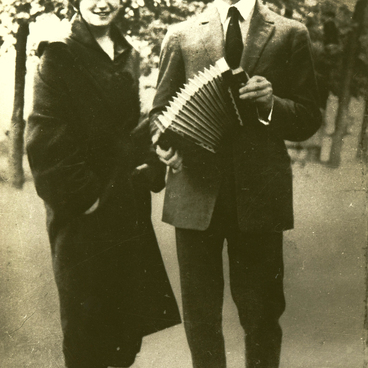Shown in the photograph is Alexandra Esenina, the poet’s younger sister, whose family kept this photograph. She lived a long life and devoted herself to care of her family and her brother’s memory. Alexandra was the initiator of opening the poet’s museum in Konstantinovo and consultant on issues relating to his life and carrier. She kept and presented to the museum many books making up the personal library of Sergei Esenin, his personal possessions and photographs. Her memoirs published under the title of “Everything That”s Near and Dear to Me” (1965) are of particular interest.
Alexandra Esenina was born in a village of Konstantinovo, and lived in Moscow since 1924. Esenin devoted to his sister such poems as “I haven”t seen so beautiful ones”, “Ah! How many cats in the world”, “Sing me the song as before”, and “In this world I am just a passer-by”. The poet was her senior by nearly 16 years and retained the moving paternal attitude to Alexandra through his life. Having returned from abroad in 1924, Esenin took Shura to Moscow, but it fell to them to live together just awhile — the poet died on December 28, 1925.
When living in Konstantinovo, as Alexandra remembered, “Sergei Esenin used to come home each summer, but all my reminiscences became one. Even his arrival was unusual not only for us, but for all home folks. Sergei Esenin liked to come to the house on a cab of a reckless driver (they were called “likhachi”) or on a pair that raced, balls to the wall, and road cart wheels skim over the ground leaving behind a heap of road dust. Upon his arrival the usual routine at the house was disrupted: open suitcases are on the floor, books appeared on the windows, the samovar remained on the table for a long time. Even the air in the cottage changed over — it was saturated with tobacco smoke mixed with eau de cologne’.
Some months before his death the poet dedicated to his sister the following lines: ‘Hence I won’t hide forever, // That we got to love this land of ours, // Not separately, not apart, // But with the same love, you and me.’ He sought embodiment of the love for motherland in the image of the family. “The mood of these words is not life-asserting, but parting; therefore, in the cycle dedicated to sister Shura the present time is replaced with the past one”, — consider literary scholars Oleg Lekmanov and Mikhail Sverdlov, authors of the biography of Sergei Esenin.
Alexandra Esenina was born in a village of Konstantinovo, and lived in Moscow since 1924. Esenin devoted to his sister such poems as “I haven”t seen so beautiful ones”, “Ah! How many cats in the world”, “Sing me the song as before”, and “In this world I am just a passer-by”. The poet was her senior by nearly 16 years and retained the moving paternal attitude to Alexandra through his life. Having returned from abroad in 1924, Esenin took Shura to Moscow, but it fell to them to live together just awhile — the poet died on December 28, 1925.
When living in Konstantinovo, as Alexandra remembered, “Sergei Esenin used to come home each summer, but all my reminiscences became one. Even his arrival was unusual not only for us, but for all home folks. Sergei Esenin liked to come to the house on a cab of a reckless driver (they were called “likhachi”) or on a pair that raced, balls to the wall, and road cart wheels skim over the ground leaving behind a heap of road dust. Upon his arrival the usual routine at the house was disrupted: open suitcases are on the floor, books appeared on the windows, the samovar remained on the table for a long time. Even the air in the cottage changed over — it was saturated with tobacco smoke mixed with eau de cologne’.
Some months before his death the poet dedicated to his sister the following lines: ‘Hence I won’t hide forever, // That we got to love this land of ours, // Not separately, not apart, // But with the same love, you and me.’ He sought embodiment of the love for motherland in the image of the family. “The mood of these words is not life-asserting, but parting; therefore, in the cycle dedicated to sister Shura the present time is replaced with the past one”, — consider literary scholars Oleg Lekmanov and Mikhail Sverdlov, authors of the biography of Sergei Esenin.





